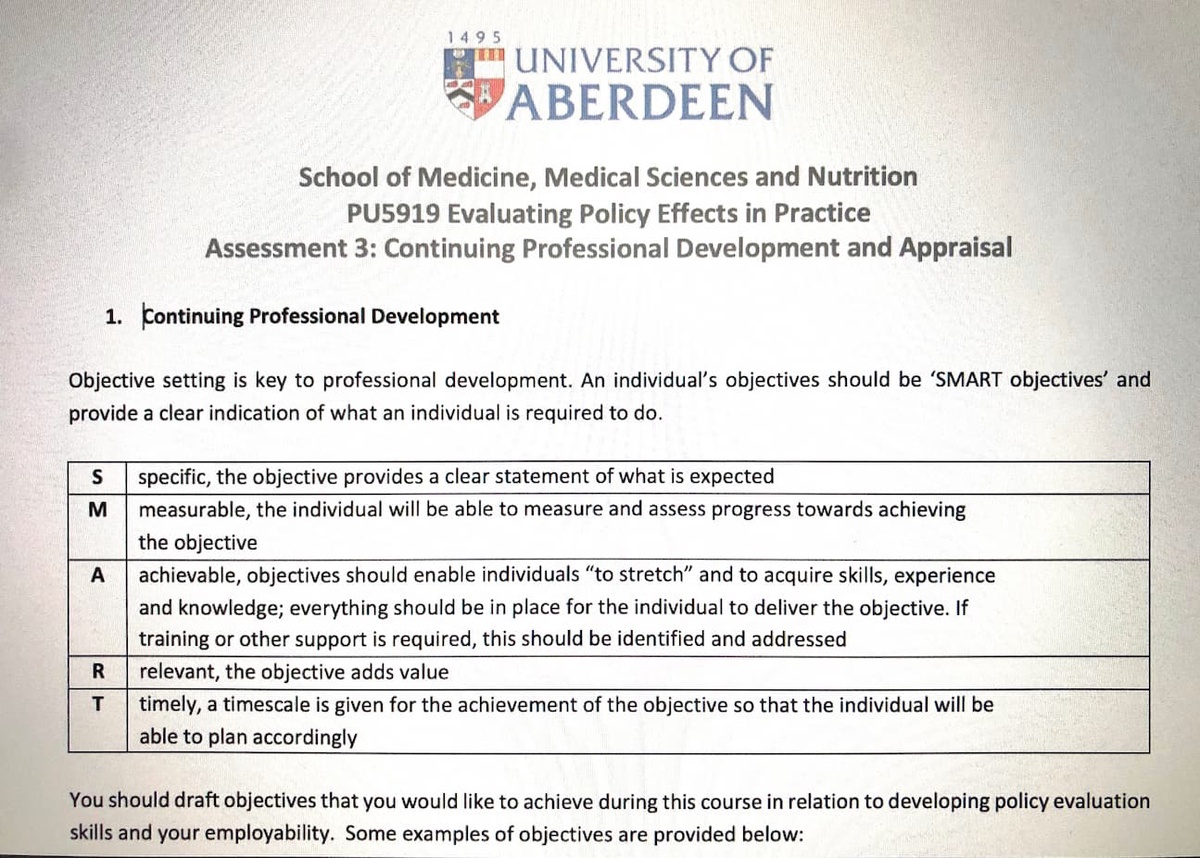Dr Heather Morgan, School of Medicine, Medical Sciences & Nutrition

- Overview
-
The Continuing Professional Development and Appraisal assessment is one of four within PU5919 Evaluating Policy Effects in Practice, a 30-credit elective course for online Master of Public Health (MPH) and MSc Clinical Nutrition taught postgraduates. The course allows part-time students to continue studying over their third semester and is an alternative for those who are not seeking research training through a 60-credit research project. This appeals to the working health and social care professionals who take our programmes: they want to spread their workloads and their interests are focused on professional rather than research skills development.
- Activity
-
Students strategically develop policy evaluation skills and enhance employability for related roles by focusing on and documenting their progress alongside performing a policy evaluation. Students present this assessment in an appraisal document (proforma), with professional development components for policy evaluation, including structured objectives (intentions) and appraisal (outcomes), plus before and after skills matrices.
For the first part (formative), students are guided in an early synchronous session to create a

- Impact
-
Students benefit from this non-exam assessment as they explicitly align coursework with broader career goals, acknowledging their current roles as health and social care professionals and what they need to do to realise their future ambitions, e.g. promotion or new role/organisation, to plan and document targeted professional development. The proforma represents a scaffolded approach: the assessment process and format are modelled on the University of Aberdeen staff annual review, with additional components (i.e. before/after skills matrices), a structure that is clear. Students are guided through online synchronous sessions for skills development and have one-to-one sessions with the Course Co-ordinator to build their 'living document' throughout the teaching weeks. Students receive pre-submission feedback and participate in an online peer appraisal, so they have opportunities to improve their drafts before submitting. This is an authentic assessment relevant to the student cohort and is also personalised and tailored to individual contexts and needs.
- Evaluation
-
Students on the course are able and encouraged to comment on the process of undertaking this assessment in their online Reflective Journals (which they are required to complete weekly as a formative assessment) and are asked to provide upwards feedback through the appraisal document itself as there is a space for an entry/comment on this at the end. In addition, they are directly asked for their feedback on this specific assessment within the Course Evaluation Form. It is the first year that this assessment has run and so it will be evaluated as part of the course review.
I also introduced the professional development appraisal method on another course this year, PU5548 Work-Based Placement in Applied Health Sciences, which is on campus, and my intention is to plan and conduct formal pedagogical research on work-oriented learning, professional development planning and assessment over the next two years.
- Dissemination
-
I have informally shared this assessment practice with colleagues at the University, but plan to do so formally through a presentation/poster at a future internal event. I am also drafting a blog post for my 'in development' site “Pedablogy” here: https://heathermaymorgan.com/pedablogy/ and will submit an abstract to an external conference - describing the implementation and evaluation of the assessment. In time, when I have completed formal pedagogical research into this practice, I will submit a conference abstract and manuscript reporting the findings and implications for international reach among the broader University learning and teaching community, with reflections on the place of this assessment type within work-oriented courses and beyond.
